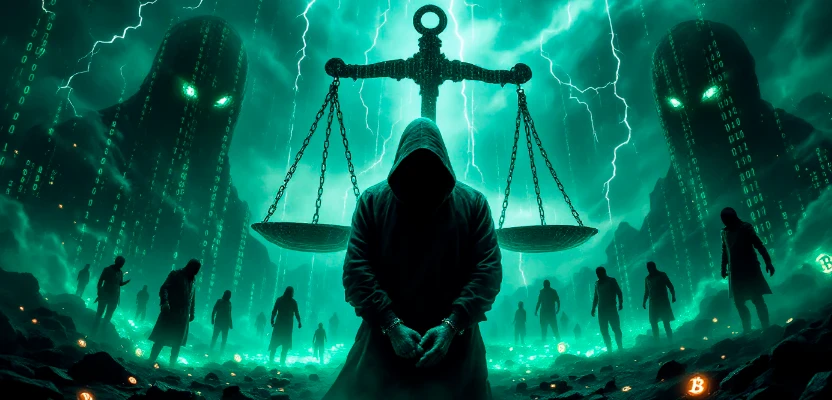
Roman Sterlingov, a dual citizen of Russia and Sweden, has been sentenced to 12 years and six months in federal prison. The man behind Bitcoin Fog, the longest-running cryptocurrency “mixer” on the darknet, now faces the consequences of enabling the laundering of over $400 million in bitcoin transactions between 2011 and 2021. His platform provided cover for some of the most notorious crimes committed in the digital era.
The Rise and Impact of Bitcoin Fog
Bitcoin Fog was launched in 2011 as one of the pioneering cryptocurrency mixing services. By breaking the link between bitcoin senders and recipients, mixers like Bitcoin Fog allow users to conduct transactions anonymously, making them popular on the darknet. Over a decade, Bitcoin Fog processed 1.2 million bitcoins, which were worth around $400 million at the time. The service was especially appealing to those engaged in illicit activities such as drug trafficking, identity theft, computer crimes, and the distribution of child sexual abuse material.
The anonymity offered by Bitcoin Fog fueled a booming trade in illegal goods and services. Yet, this facade of secrecy could not protect Roman Sterlingov from law enforcement’s growing expertise in tracking blockchain transactions. His story serves as a reminder of how even seemingly impenetrable digital systems are vulnerable to determined investigation.
Uncovering the Web of Crime
The investigation into Bitcoin Fog was an international effort that showcased the evolving capabilities of modern law enforcement. Spearheaded by the U.S. Internal Revenue Service (IRS) and the Federal Bureau of Investigation (FBI), the operation relied on cutting-edge blockchain analysis techniques and global cooperation. Support came from the U.S. Department of Justice’s Office of International Affairs and the FBI's Virtual Asset Unit, which coordinated with authorities from Japan, Sweden, Denmark, Romania, the United Kingdom, and Europol.
IRS Criminal Investigation Chief Guy Ficco praised the operation, stating, “Sterlingov’s efforts to remain anonymous were outmatched by a coordinated and sophisticated investigative approach.” The case exemplifies how international teamwork can dismantle even the most complex cybercrime networks.
The investigators meticulously pieced together evidence by tracking the digital footprints left behind by Sterlingov and his associates. The case also highlighted how cryptocurrency, despite its reputation for anonymity, can be traced when law enforcement employs advanced tools and collaboration across borders.
The Courtroom Drama and Guilty Verdict
In March 2024, a Washington, D.C. jury found Sterlingov guilty after a month-long trial. He was convicted on multiple charges, including conspiracy to launder money, operating an unlicensed money transfer business, and engaging in unregistered money transmission. The prosecutors laid out a clear narrative: Sterlingov’s Bitcoin Fog service acted as a financial gateway for the darknet’s most dangerous players, from narcotics traffickers to cybercriminals exploiting innocent victims.
Deputy Attorney General Lisa Monaco commented on the significance of the conviction: “Sterlingov ran the darknet’s longest-operating bitcoin laundering service. This case sends a powerful message: no one is above the law, not even those hiding in the digital underworld.” Her words underscored the government’s commitment to dismantling criminal networks and imposing serious consequences on their operators.
U.S. Attorney Matthew M. Graves for the District of Columbia added, “Today’s sentence is a warning to those who facilitate criminal payments online. We have the tools and expertise to hold you accountable.” The outcome of Sterlingov’s trial set a new standard for prosecuting cybercriminals operating on the darknet.
A Heavy Price: Prison Time and Financial Penalties
In addition to serving over a decade in prison, Sterlingov faces severe financial consequences. The court ordered him to pay $395,563,025.39 in forfeiture, a staggering amount reflecting the illicit funds laundered through Bitcoin Fog. Authorities also seized his remaining assets, including approximately $1.76 million in cryptocurrency and a Bitcoin Fog wallet holding 1,345 bitcoins. At today’s prices, this wallet is valued at more than $103 million.
These penalties demonstrate the high stakes involved in cybercrime. Law enforcement agencies aim not only to imprison offenders but also to strip them of their illegally gained wealth. The case of Roman Sterlingov sends a clear message: even in the world of digital finance, crime does not pay.
The Broader Implications for Cryptocurrency Regulation
Sterlingov’s sentencing has reignited discussions about the regulation of cryptocurrency and the use of mixers. Principal Deputy Assistant Attorney General Nicole M. Argentieri of the Department of Justice’s Criminal Division stated, “This conviction shows our determination to combat those who help criminals hide their profits. Services like Bitcoin Fog are not invisible; they are within our reach.”
The case has highlighted the need for stricter regulations to prevent the misuse of cryptocurrency. Governments worldwide are working to close loopholes and ensure that digital currencies do not become safe havens for criminal enterprises. Blockchain technology, while revolutionary, remains a double-edged sword: it can empower individuals and businesses but also facilitate illegal activities when used improperly.
International Law Enforcement: A United Front
One of the most striking aspects of this case was the level of international cooperation involved. The coordination between the U.S. and foreign partners was critical in bringing Sterlingov to justice. Authorities from multiple countries played significant roles in tracking down digital evidence and executing crucial operations.
David Sundberg, Assistant Director in Charge of the FBI Washington Field Office, stressed the importance of these alliances. “Cybercrime knows no borders, and our efforts must be just as far-reaching. The FBI will continue to leverage every partnership and tool to disrupt criminal ecosystems.” The Bitcoin Fog case is a testament to how effective global collaboration can be in tackling complex cyber threats.
Other High-Profile Cybercrime Cases
The crackdown on Bitcoin Fog is part of a broader effort by the Department of Justice to combat cybercrime. Recently, Nigerian national Babatunde Francis Ayeni was sentenced to ten years in prison for his role in a cyber fraud conspiracy that defrauded over 400 victims across the United States. His scheme, which targeted real estate transactions, resulted in nearly $20 million in losses.
Another case involved Kolade Akinwale Ojelade, who was sentenced to over 26 years for a phishing and spoofing attack that intercepted wire transfers in real estate deals, causing approximately $12 million in losses. These cases reveal the extent to which cybercriminals are targeting financial systems and underscore the need for relentless vigilance.
Conclusion: A Landmark Case in the Fight Against Digital Crime
The conviction of Roman Sterlingov marks a significant victory in the ongoing war against cybercrime. As authorities continue to develop more sophisticated methods of tracking and prosecuting online criminals, cases like Bitcoin Fog stand as a warning: anonymity in the digital world is not foolproof.
The story of Bitcoin Fog underscores the importance of international cooperation and the ever-evolving tools of law enforcement. As technology advances, so too must the measures to combat its misuse. The message is clear: the age of impunity for cybercriminals is drawing to a close.





Comments 0